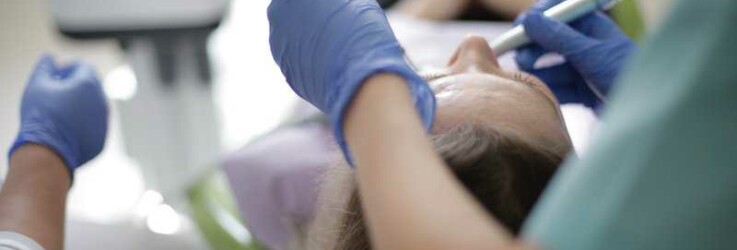Blog
Why Dental Checkups Are So Important

You’ve heard time and time again about how it’s important it is to see your dentist in Douglasville every six months for a checkup. But why do we recommend visiting us twice a year? Do you really need dental checkups that often? The short answer is yes, but let’s take a deeper look into why these bi-annual dental checkups are so important.
Cleaning Teeth
One of the most important parts of seeing your dentist in Douglasville every six months is to get your bi-annual dental cleaning. These cleanings go above and beyond taking care of your teeth at home and will help remove any plaque or tartar that occurs naturally over time. If plaque and tartar aren’t removed, which can only be done through gentle professional cleanings, they can build up and increase the risk of decay, gum disease, and other problems.
Spotting Cavities
Cavities are the most common dental ailment, and they often come along with tooth pain, sensitivity, and other discomforts. However, they can also be so small that they don’t have any symptoms at all. This is the ideal time for a dentist to spot and treat any areas of decay. After all, the longer cavities go undetected, the more likely they are to cause pain. Dental checkups every six months will allow your dentist to monitor any changes to your oral health and see below the surface to diagnose and treat cavities before they lead to problems.
Diagnosing Gum Disease
Gum disease is a serious oral health problem that can develop for a number of reasons. Most often, gum disease is a result of poor oral hygiene and the buildup of plaque and tartar, but certain medical conditions, medications, smoking, and stress are also known contributing factors. Keeping an eye on gum health during your regular dental checkups is the best way to diagnose gum disease early when it’s easier to treat. In fact, early intervention is key to successfully treating and reversing gum disease. If it’s left untreated for too long, it can become irreversible.
Checking for Oral Cancer
While smokers, those over 55, and heavy drinkers are more susceptible to developing oral cancer, it can affect anyone at any time. In fact, more than 50,000 new cases of oral cavity or oropharyngeal cancer were diagnosed in 2022. As with gum disease, early detection of oral cancer is key to successful treatment, and it may just save your life. Your dentist will look for any potential signs of oral cancer during your appointments.
Many patients will only schedule an appointment when they’re experiencing a problem. But the truth is, maintaining regular dental checkups can help avoid these problems in the first place. If you’re overdue for your dental checkup, schedule an appointment with your dentist in Douglasville today.
What Not to Do After a Wisdom Tooth Extraction

An estimated 85% of Americans will have their wisdom teeth extracted in their lifetime. While this procedure usually takes place in the late teens or early twenties, your dentist in Douglasville may recommend it at any time, especially if they’re starting to cause problems. Even though wisdom teeth surgery is incredibly common and doesn’t typically cause problems, there are some things you should avoid after having a wisdom tooth extraction.
Things to Avoid
Although the recovery time from wisdom teeth surgery is usually pretty quick, there are some key things to avoid during this time to help speed up the healing process and avoid complications.
- Chewing
Of course, you need to eat while you’re recovering, but you do need to be careful about what you eat. Your dentist in Douglasville would recommend that you avoid hard, sticky foods during the first 72 hours.
- Activity
One of the best ways to promote healing is to rest. Avoid doing any strenuous physical activity for three days following surgery. Doing too much too soon can make bleeding, swelling, and pain worse.
- Smoking
Ingredients in cigarettes and cigars are certainly cause for concern, especially after surgery, but the action of dragging on a cigarette can be even more problematic. Pulling in air from a cigarette, or even a straw, can loosen the blood clots protecting and sealing the surgical sites. If those blood clots are dislodged too early, it can lead to a painful condition known as dry socket.
Signs of a Problem
Many wisdom teeth extractions occur without any problems, but the risk for complications doesn’t go away completely. Here are some signs that require a call to your dentist or oral surgeon.
- Excessive pain, bleeding, or swelling after three days
- Pus coming out of the surgical site or nose
- A fever over 100 degrees Fahrenheit
- Difficulty swallowing or breathing
- Facial numbness
What Should You Do After Surgery?
We’ve covered some of the things you shouldn’t do while recovering from having your wisdom teeth taken out, now let’s talk about something you should do.
- Ice Often
Ice is one of the best ways to reduce swelling and ease pain. Apply a cold compress to the affected and keep the area cold. However, make sure to have a thin barrier between the ice pack and your skin.
- Clean the Area
Your dentist may provide or recommend that you use a mouthwash during recovery in order to keep the area clean. Use it, but use it gently. Swishing slowly and softly will clean the areas without the risk of damage.
- Take Medications
Antibiotics and pain medication may be prescribed after your treatment. Take these as recommended as they can help with both preventing infection and easing pain during your recovery.
Not everyone will need to have their wisdom teeth removed, but most people will. Make sure to see your dentist in Douglasville regularly and report any symptoms of wisdom tooth pain at that time. If it’s recommended that you have your wisdom teeth extracted, always feel free to ask questions so you feel confident in the procedure and healing time.
